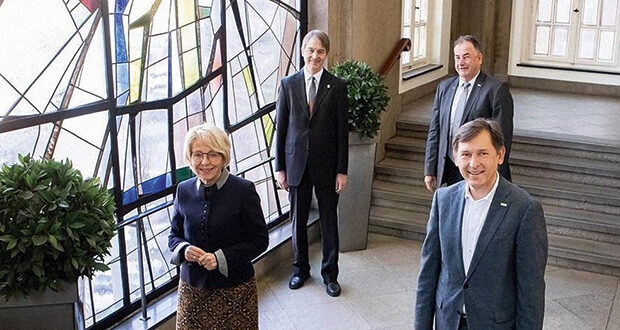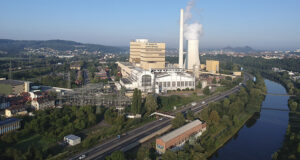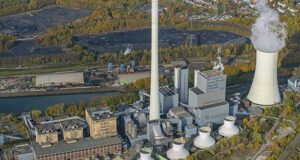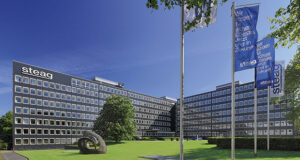The City of Herne, the RAG-Stiftung, -Essen, and the TH Georg Agricola University (THGA), Bochum, announced their ideas and plans for THGA’s Research Center of Post-Mining (FZN) on 16th April 2021 (Figure 1). The three partners are aiming to establish the internationally renowned scientific institution in Herne. To support this endeavour, a funding application has been submitted to secure funds from the Five Locations Programme. With the aim of creating new opportunities as part of the structural change for regions that are particularly affected by the fossil-fuel phase-out, the German government is supporting five locations of coal-fired power stations in North Rhine-Westphalia between now and 2038 with up to 662 M € in funding.
Herne is one of the locations that can take advantage of this extra funding. The other locations are Gelsenkirchen, Duisburg, Hamm and the district of Unna. The programme and the funding commitments are being administered by the State of North Rhine-Westphalia. A strategic advisory board and a structural strengthening council assess the relevant proposals.
For the City of Herne, the establishment of the university institution would provide some fantastic opportunities to continue driving forward the future-oriented revitalisation of the city. The desired establishment of the FZN in the Funkenberg region near Herne train station would play an important role in the strengthening of the local job market and the location as a regional centre for science. “Establishing the FZN would enable us to create new opportunities in Herne for cutting-edge research in the heart of the Ruhr. It would also be a big step forward for the future development of our city,” says Mayor Frank Dudda, describing the importance of these particular plans for the entire city and for the Ruhr region. Together with the Urban Art Center Ruhr, which is planned for Wanne city centre, and another top scientific institution, the future is looking promising for Herne, with some great regional opportunities that could soon become a reality thanks to the Five Locations Programme. “We have strong, reliable partners by our side with the FZN, and we are extremely grateful to the THGA and the RAG-Stiftung for that,” Dudda continues.
The FZN was initiated by the RAG-Stiftung and THGA and established in 2015. “Through our financial support for the FZN over the past few years, we have carried out some crucial development work, and we will continue to be a reliable partner for THGA and the Research Center in the future. But it is now time for this responsibility to the FZN to be shared by more, broader shoulders,” explains Bärbel Bergerhoff-Wodopia, Member of the Board of Management at the RAG-Stiftung and Chair of the THGA University Council. “That is why we, together with the City of Herne, are working hard to see that the FZN receives the funding required to do this. At the same time, we are supporting the successful transformation of our region,” adds Bergerhoff-Wodopia.
Mining leaves its mark. And managing this legacy in a responsible way is a big challenge – not just in Germany, but around the world. Since its foundation, the THGA FZN has pooled the expertise required to shape the technical, economic and environmental consequences of mining. The scientists take an interdisciplinary approach to their research, investigating how the complex tasks involved in the closure of coal mines and re-use of the affected areas can be tackled while paying particular attention to future potential. Nowhere else in the world is doing this. This integrative approach has given rise to four research areas so far: perpetual tasks and mine water management, geomonitoring in post-mining, materials science for the preservation of industrial heritage, and reactivation and transition.
The FZN itself is also becoming more and more complex and grows with each challenge it faces. As a pioneering institution for people, nature and the environment in former mining regions, its aim is to become the German Research Center of Post-Mining (DFZN). “We examine the consequences of mining from all angles. We want to continue to build our reputation and expand our research fields over the coming years and become the go-to place for all scientific and social issues relating to post-mining,” explains Prof. Ulrich Pasche-dag, Head of the Research Center. “With excellent connections across Germany and the world, the DFZN will become an international “think tank” for post-mining and play an important leading role in this field. It will also help to develop sustainable, holistic concepts for extracting georesources in Germany, Europe and the world, making it indispensable to the long-term implementation of raw materials strategies in Germany and the EU.”
Establishing a new site in Herne would create new opportunities as the centre seeks to evolve into the DFZN, explains THGA President Prof. Jürgen Kretschmann: “Unfortunately, we have very limited space in our historic university building in Bochum. A new site in Herne would enable us to build world-class laboratories and expand our research activities.” Ample offices, seminar rooms, a library and an archive are also planned. From around 2025, 60 to 80 scientists would then be able to examine every aspect of post-mining centrally in a single location, making an important contribution to the development of the city and the region and enabling their findings to be applied in society. “Naturally, the DFZN would remain closely linked to the THGA in Bochum,” Kretschmann adds. The “Geological Engineering and Post-Mining” master’s course in particular would also benefit from the new facilities. This unique course trains experts at the interface between mining, surveying and geotechnics. Graduates understand the safety and remediation measures required in the extraction of raw materials and are in high demand on the job market.
“In the new special laboratories, our students and young scientists would be able to undertake their own project work and research in state-of-the-art facilities,” says Prof. Kretschmann. “Plus they would only be a – direct – underground ride away from the THGA.” This set-up would also mean that the DFZN’s findings could be incorporated even more directly into the course and doctoral seminars, so graduates and doctoral candidates are always up to date with the latest developments in post-mining research, Prof. Kretschmann explains. “This is unbeatable expertise – even on an international level.”
(RAG-Stiftung/Si.)



